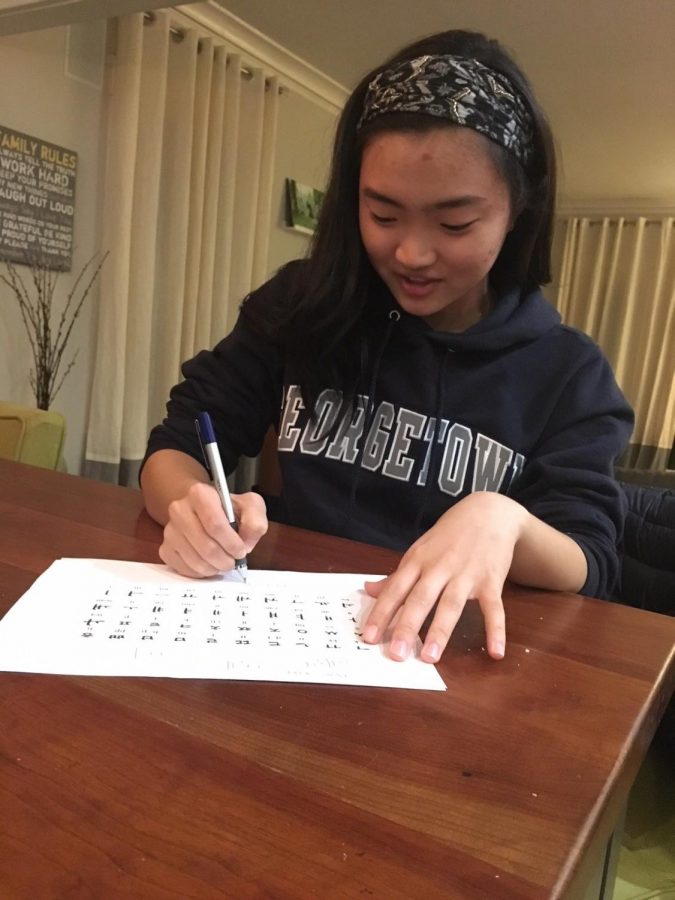Breaking down the language barrier
The influence of how we speak
Every language has words that are unable to be translated. Whether it has a complex meaning or a lack of words to describe it, some words simply exist in one language. In Korean, the word “ah-Ka-wuh”, has no English equivalent, and describes a loss of something in your grasp; something that has slipped away. For Sarah Likins, this word hardly describes her endeavor to grasp Korean, as she has spent the last couple of months learning the language.
Likins was born in Austin, Texas to a Korean family, and learned to speak Korean living with her grandparents. After they moved, however, her parents stopped speaking Korean in the house, and she eventually lost the ability to speak it fluently. When she was around 8 or 9, she had a second wind to learn the language, and attended Korean classes in Duluth. Now, Likins studies Korean at home, learning the alphabet, studying the meanings, and watching Korean dramas.
“I wanted to learn Korean to [help communicate] with my grandparents because they can’t speak english, and so it’s really hard to communicate with them,” Likins said. “My cousins can [speak Korean] so it’s just kind of like a barrier, so the closer that I get to learning Korean the better for my family.”
She has found the language to be slightly difficult to pick up, but also admired the structured simplicity of the alphabet.
“All of the letters are pronounced the same way every time, there are no exceptions to it, and the way that you spell is grouped by syllabes,” Likins said. “It is completely phonetic. Every single syllable is spelled out and you say it by syllable, instead of the words jumbling together, it’s all syllable by syllable.”
Her parents have been extremely supportive of her interest in the language.
“She has always been interested but recently more interested since she spoke with non Koreans who have learned to read and write Korean,” said Christina Likins, Sarah’s mother. “She is showing interest in her culture, a sign of self-love.”
Language has always been an important part of Likins’ life, which she shows not only through her interest in learning Korean but in the classes she takes at school. She currently takes both Latin and Spanish, a combination that isn’t always found at Grady.
“I would say [learning another language] is extremely important especially for people in America even though everyone these days learns English,” Likins said. “It also just shows to other people that you care enough learn another language and that you are cultured.”
Likins believes that learning other languages is essential to communication in the modern world, and helps to better develop not only a person’s literacy skills but other areas as well.
“Your brain is flexible, and if you don’t exercise a part of your brain it will go dormant,” Likins said. “Reading and solving problems stretch your brain in a way. Learning languages stretches your brain in a different way, it makes it easier for you to learn in general.”
Learning Korean has also helped Likins reconnect with a part of her own identity.
“I was always really conflicted because I didn’t know if I was American or if I was Korean,” Likins said. “I would ask my mom what percentage Korean am I, and she would say 100 percent. I would ask her what percentage American am I, and she would say 100 percent. I wondered how I could be 100 percent of two different things and she would say ‘you just are’. “
Her family also noticed the confliction.
“For a time, Sarah was a bit confused or unsure of what it meant to be a Korean- American,” said Gene Likins, Sarah’s father. “She thought that if she used her Korean name and visited Korea she would fit right in. I told her that it would not be that easy. It’s not how you look that makes you Korean, it’s how you think and how you grow up.”
On top of the two languages that she is currently learning, practicing Korean has only supported Likins’ notion of the importance of learning languages.
“Knowing how those people speak and write, you are learning a whole fraction of their culture and becoming a part of it,” Likins said.
Likins cites the reconnection with her family and identity as well as the importance of knowing languages in her reasons for learning Korean.
“One of the building blocks of all cultures is language,” Likins said. “Everyone, I feel, sees the world differently based on how they speak and how they write, so if you are able to look at another language and the culture that speaks it is will be so much easier to understand their culture.”

Tyler Jones is a senior in her fourth year writing for the Southerner. When she is not writing features on anything Atlanta, you can usually find her in...

